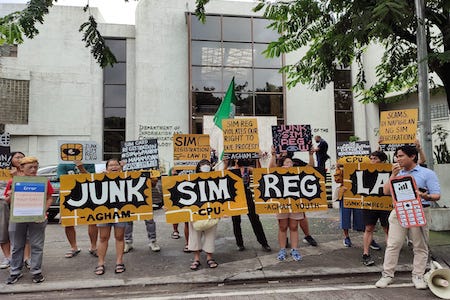
It’s been more than a year since Ferdinand Marcos, Jr. was inaugurated as the President of the Philippines, after winning an election mired with fraud, according to election watchdogs. In his two State of the Nation Addresses so far, he has used the term “digital transformation” to describe a campaign that promises efficiency of services and better management for his government.
“[Digitalization] is the greatest, most powerful tool,” he declared in a 2023 speech, “...not just to improve the ease of doing business, but also against many forms of graft and corruption.” In another speech from the year before, he again mentioned digitalization saying, “The depth and breadth at which these technologies will be transformative in our lives is fully expected,” almost alluding to an inevitability of supposed positive changes. However, words and projected visions should always come under scrutiny especially when digital rights are not considered in the agenda. Keeping in mind some of the Democratic Principles for an Open Internet, how has Marcos Jr. fared in securing safer digital spaces for Filipinos in his first 500 days in office?
Attacks against free expression have intensified.
Only a month after Marcos Jr.’s election victory, access to 27 websites which included activist groups and independent media outfits were blocked by the government citing the Anti-Terrorism Act of 2020. Although this happened under the previous Duterte administration, a year has passed and the order by the National Telecommunications Commission still remains in effect. A few months later, the distribution and publication of books that were tagged as “subversive” were banned by the government. This, in addition to the Facebook takedown of posts related to the late poet and activist Jose Maria Sison, signaled the continued censorship.
At least four journalists have been killed under the current administration, with the latest being radio broadcaster Juan Jumalon, who was shot while streaming on Facebook Live in his home studio in Misamis Occidental. According to digital forensics experts, DDoS attacks against Bulatlat continue to 2023, and black hat SEO operators have also targeted media organizations like Rappler, Philstar, and CNN Philippines.
Given Marcos Jr.'s history of limiting engagement with journalists, involvement in historical reinterpretation, and apparent advantages from election-related misinformation on social media platforms, there is a degree of skepticism surrounding his announcement of a media and information literacy campaign in collaboration with TikTok, X (formerly known as Twitter), Facebook, and other platforms. There are concerns about the potential implications of an existing bill that aims to block piracy-related websites, as it raises questions about its impact on online freedom of expression.
Surveillance has become more institutionalized.
Marcos Jr.'s first signed law was the SIM Card Registration Act, which required users to register their personal information and valid identification with their service providers, or risk their cards being deactivated. Originally touted as a solution to scams and disinformation, the measure not only prohibits access to telecommunications, social media networks, and the use of e-banking and services, but it also opens up many risks related to privacy.
According to Privacy International, “mandatory SIM registration places individuals at risk of being tracked or targeted, and having their information misused.” In addition, “SIM registration undermines the ability of users to communicate anonymously…[posing] a threat to vulnerable groups, and facilitates surveillance by making tracking and monitoring of users easier for law enforcement authorities.”
I’ve been waiting more than a year now for my physical National ID, a recent rollout under the Philippine Identification System that privacy advocate Jamael Jacob proclaims is set up for failure. According to Jacob, there is a potential for the use of the record history feature, which could keep detailed information on an individual’s activities and transactions.
People’s highly sensitive information is unsecured.
A string of recent cyber attacks against government agencies have highlighted the vulnerability of citizens’ highly sensitive personal data.
Records under multiple agencies such as the Philippine National Police, National Bureau of Investigation, Bureau of Internal Revenue, and Special Action Force were exposed in what was described as “readily accessible to individuals with an internet connection” in a data breach early this year.
The information of over 36 million members of the Philippines’ state health insurer PhilHealth was held for ransom by a hacker group months later, with the agency refusing to pay resulting in a leak amounting to 734 gigabytes of Filipinos’ data.
The Philippine Statistics Authority admitted a data breach in its Community-Based Monitoring System, a program intended for poverty alleviation and economic development. Numerous other agencies such as the Department of Science and Technology and Technical Education and Skills Development Authority, and even Clark International Airport were also targeted, exposing the weak data protection practices of the Philippines and putting people’s security in danger.
With internet freedom in the Philippines in a decline, the Marcos Jr. administration must act on the call of concerned Filipinos and digital rights organizations to repeal laws and programs that restrict freedoms and harm its citizens. The current government must immediately revoke the Anti-Terrorism Act, repeal the SIM Card Registration Act, and make steps in decriminalizing libel to achieve more just online and offline spaces for everyone. Digital justice must always be at the heart of any “digital transformation” campaign: recognizing the 2015 Philippine Declaration on Internet Rights and Principles and the latest Filipino People’s Digital Justice Declaration could be small but welcome developments towards better digital lives.
- Log in to post comments